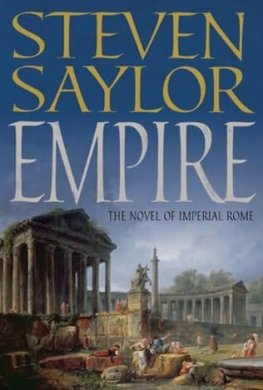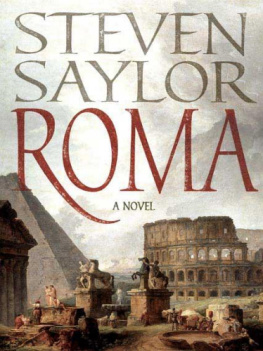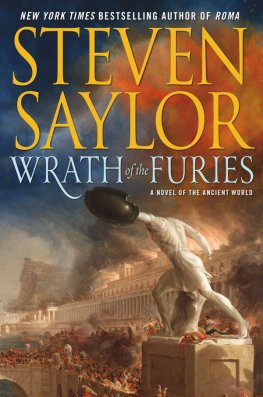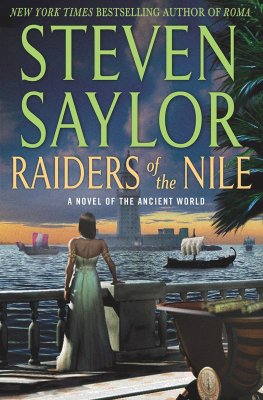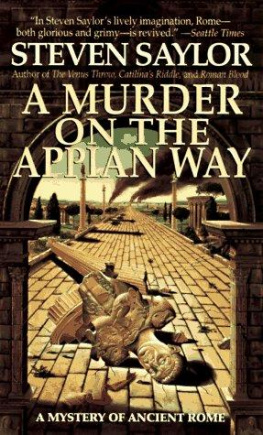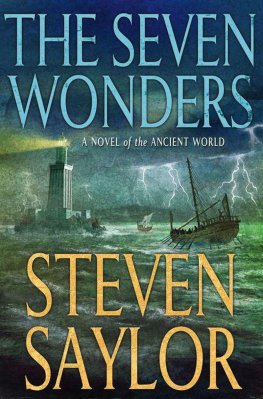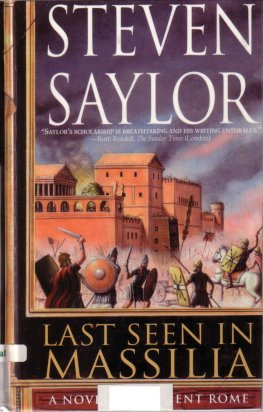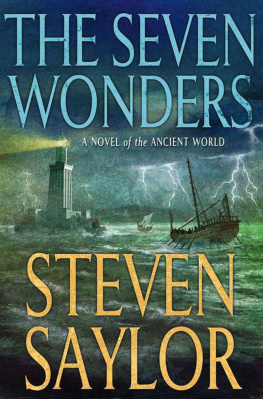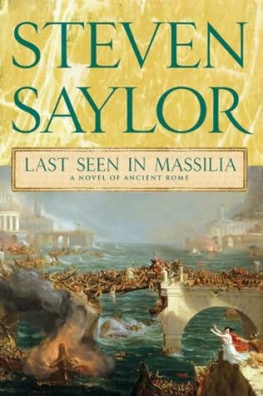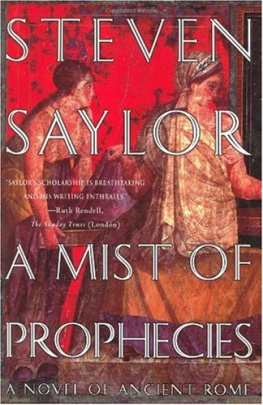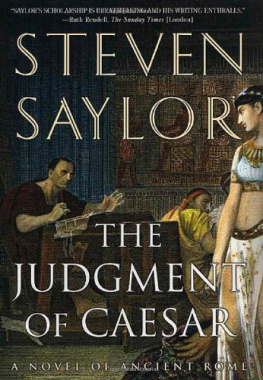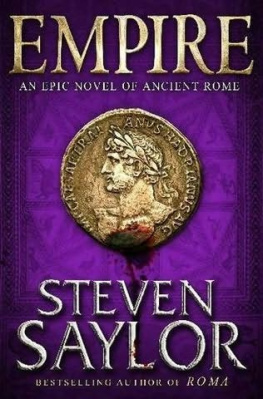Steven Saylor - Roma.The novel of ancient Rome
Here you can read online Steven Saylor - Roma.The novel of ancient Rome full text of the book (entire story) in english for free. Download pdf and epub, get meaning, cover and reviews about this ebook. genre: Adventure. Description of the work, (preface) as well as reviews are available. Best literature library LitArk.com created for fans of good reading and offers a wide selection of genres:
Romance novel
Science fiction
Adventure
Detective
Science
History
Home and family
Prose
Art
Politics
Computer
Non-fiction
Religion
Business
Children
Humor
Choose a favorite category and find really read worthwhile books. Enjoy immersion in the world of imagination, feel the emotions of the characters or learn something new for yourself, make an fascinating discovery.

- Book:Roma.The novel of ancient Rome
- Author:
- Genre:
- Rating:3 / 5
- Favourites:Add to favourites
- Your mark:
- 60
- 1
- 2
- 3
- 4
- 5
Roma.The novel of ancient Rome: summary, description and annotation
We offer to read an annotation, description, summary or preface (depends on what the author of the book "Roma.The novel of ancient Rome" wrote himself). If you haven't found the necessary information about the book — write in the comments, we will try to find it.
Roma.The novel of ancient Rome — read online for free the complete book (whole text) full work
Below is the text of the book, divided by pages. System saving the place of the last page read, allows you to conveniently read the book "Roma.The novel of ancient Rome" online for free, without having to search again every time where you left off. Put a bookmark, and you can go to the page where you finished reading at any time.
Font size:
Interval:
Bookmark:
Steven Saylor
Roma
To the shade of Titus Livius, known in English as Livy, who preserved for us the earliest tales of earliest Rome

ROMAN MONTHS AND DAYS
The names of the Roman months were Januarius, Februarius, Martius, Aprilis, Maius, Junius, Quinctilis (later Julius, to honor Julius Caesar), Sextilis (later Augustus, to honor Caesar Augustus), September, October, November, and December.
The first day of each month was called the Kalends. The Ides fell on the 15th day of Martius, Maius, Quinctilis, and October, and on the 13th day of the other months. The Nones fell nine days before the Ides.
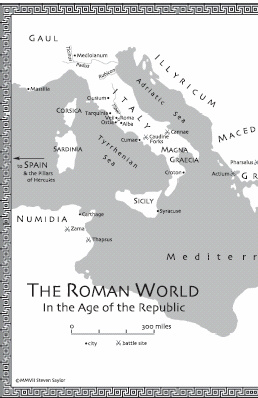
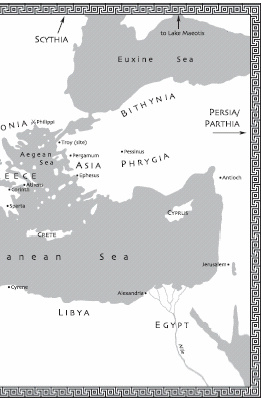
LEGEND IS HISTORICAL, JUST AS HISTORY IS LEGENDARY.
Alexandre Grandazzi, The Foundation of Rome
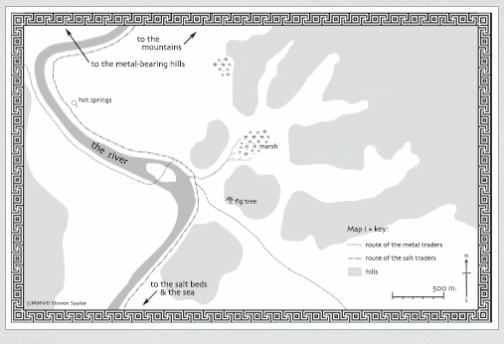
A STOP ON THE SALT ROUTE
1000 B.C.
As they rounded a bend in the path that ran beside the river, Lara recognized the silhouette of a fig tree atop a nearby hill. The weather was hot and the days were long. The fig tree was in full leaf, but not yet bearing fruit.
Soon Lara spotted other landmarks-an outcropping of limestone beside the path that had a silhouette like a mans face, a marshy spot beside the river where the waterfowl were easily startled, a tall tree that looked like a man with his arms upraised. They were drawing near to the place where there was an island in the river. The island was a good spot to make camp. They would sleep on the island tonight.
Lara had been back and forth along the river path many times in her short life. Her people had not created the path-it had always been there, like the river-but their deerskin-shod feet and the wooden wheels of their handcarts kept the path well worn. Laras people were salt traders, and their livelihood took them on a continual journey.
At the mouth of the river, the little group of half a dozen intermingled families gathered salt from the great salt beds beside the sea. They groomed and sifted the salt and loaded it into handcarts. When the carts were full, most of the group would stay behind, taking shelter amid rocks and simple lean-tos, while a band of fifteen or so of the heartier members set out on the path that ran alongside the river.
With their precious cargo of salt, the travelers crossed the coastal lowlands and traveled toward the mountains. But Laras people never reached the mountaintops; they traveled only as far as the foothills. Many people lived in the forests and grassy meadows of the foothills, gathered in small villages. In return for salt, these people would give Laras people dried meat, animal skins, cloth spun from wool, clay pots, needles and scraping tools carved from bone, and little toys made of wood.
Their bartering done, Lara and her people would travel back down the river path to the sea. The cycle would begin again.
It had always been like this. Lara knew no other life. She traveled back and forth, up and down the river path. No single place was home. She liked the seaside, where there was always fish to eat, and the gentle lapping of the waves lulled her to sleep at night. She was less fond of the foothills, where the path grew steep, the nights could be cold, and views of great distances made her dizzy. She felt uneasy in the villages, and was often shy around strangers. The path itself was where she felt most at home. She loved the smell of the river on a hot day, and the croaking of frogs at night. Vines grew amid the lush foliage along the river, with berries that were good to eat. Even on the hottest day, sundown brought a cool breeze off the water, which sighed and sang amid the reeds and tall grasses.
Of all the places along the path, the area they were approaching, with the island in the river, was Laras favorite.
The terrain along this stretch of the river was mostly flat, but in the immediate vicinity of the island, the land on the sunrise side was like a rumpled cloth, with hills and ridges and valleys. Among Laras people, there was a wooden babys crib, suitable for strapping to a cart, that had been passed down for generations. The island was shaped like that crib, longer than it was wide and pointed at the upriver end, where the flow had eroded both banks. The island was like a crib, and the group of hills on the sunrise side of the river were like old women mantled in heavy cloaks gathered to have a look at the baby in the crib-that was how Laras father had once described the lay of the land.
Larth spoke like that all the time, conjuring images of giants and monsters in the landscape. He could perceive the spirits, called numina, that dwelled in rocks and trees. Sometimes he could speak to them and hear what they had to say. The river was his oldest friend and told him where the fishing would be best. From whispers in the wind he could foretell the next days weather. Because of such skills, Larth was the leader of the group.
Were close to the island, arent we, Papa? said Lara.
How did you know?
The hills. First we start to see the hills, off to the right. The hills grow bigger. And just before we come to the island, we can see the silhouette of that fig tree up there, along the crest of that hill.
Good girl! said Larth, proud of his daughters memory and powers of observation. He was a strong, handsome man with flecks of gray in his black beard. His wife had borne several children, but all had died very young except Lara, the last, whom his wife had died bearing. Lara was very precious to him. Like her mother, she had golden hair. Now that she had reached the age of childbearing, Lara was beginning to display the fullness of a womans hips and breasts. It was Larths greatest wish that he might live to see his own grandchildren. Not every man lived that long, but Larth was hopeful. He had been healthy all his life, partly, he believed, because he had always been careful to show respect to the numina he encountered on his journeys.
Respecting the numina was important. The numen of the river could suck a man under and drown him. The numen of a tree could trip a man with its roots, or drop a rotten branch on his head. Rocks could give way underfoot, chuckling with amusement at their own treachery. Even the sky, with a roar of fury, sometimes sent down fingers of fire that could roast a man like a rabbit on a spit, or worse, leave him alive but robbed of his senses. Larth had heard that the earth itself could open and swallow a man; though he had never actually seen such a thing, he nevertheless performed a ritual each morning, asking the earths permission before he went striding across it.
Theres something so special about this place, said Lara, gazing at the sparkling river to her left and then at the rocky, tree-spotted hills ahead and to her right. How was it made? Who made it?
Larth frowned. The question made no sense to him. A place was never made, it simply was. Small features might change over time. Uprooted by a storm, a tree might fall into the river. A boulder might decide to tumble down the hillside. The numina that animated all things went about reshaping the landscape from day to day, but the essential things never changed, and had always existed: the river, the hills, the sky, the sun, the sea, the salt beds at the mouth of the river.
Font size:
Interval:
Bookmark:
Similar books «Roma.The novel of ancient Rome»
Look at similar books to Roma.The novel of ancient Rome. We have selected literature similar in name and meaning in the hope of providing readers with more options to find new, interesting, not yet read works.
Discussion, reviews of the book Roma.The novel of ancient Rome and just readers' own opinions. Leave your comments, write what you think about the work, its meaning or the main characters. Specify what exactly you liked and what you didn't like, and why you think so.

